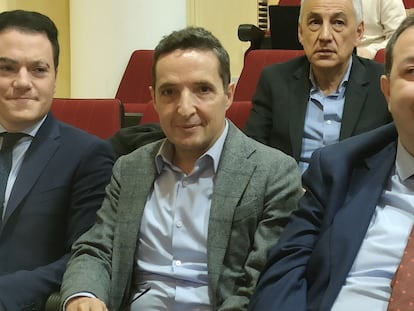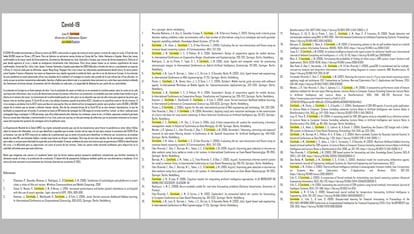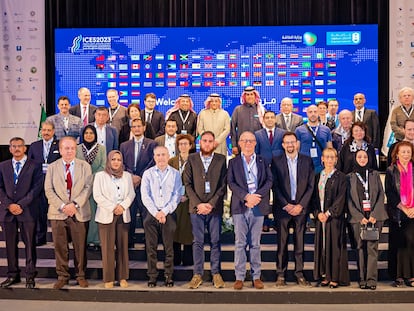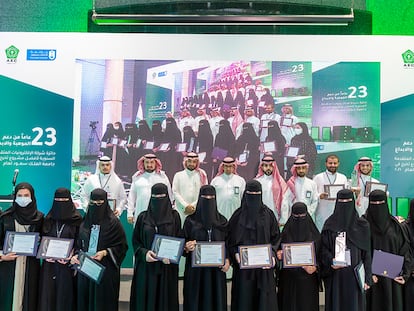The aspiring university rector who wrote a four-paragraph paper and cited himself 100 times
Juan Manuel Corchado, an expert in artificial intelligence at the University of Salamanca in Spain, falsely inflated his resume to boost his Google Scholar ranking


Professor Juan Manuel Corchado aspires to assume the esteemed position once held by philosopher Miguel de Unamuno as the rector of the University of Salamanca (Spain). According to Google Scholar, the expert in artificial intelligence (AI) and cybersecurity has garnered global recognition as one of the world’s most influential scientists. His scholarly impact is remarkable, evidenced by over 45,000 citations of his work. However, what raises eyebrows is that a significant portion of these citations were made by the professor himself. In a very short paper about Covid-19 that is only four paragraphs long, Corchado included 100 citations to his previous work, mostly unrelated to the pandemic. These citations span diverse topics such as oil spills, tourism, financial projections, and even oceanic carbon dioxide levels.
In our recent interview, the 52-year-old native of Salamanca denied that he is cheating to artificially inflate his scientific impact. Yet he has posted many short papers online that include numerous self-citations. When these papers are uploaded to a university’s scientific repository, Google Scholar indexes them to calculate and publish metrics. With 45,000 citations, Corchado appears to have a much higher impact compared to other notable figures in the field. For example, Israeli engineer Sarit Kraus, who recently won the excellence award at the prestigious international IJCAI conference, has 29,000 citations. Milind Tambe, an AI expert at Google and Harvard University, has 38,000 citations.

An anonymous whistleblower alerted EL PAÍS about Corchado’s questionable practices on April 21, 2023, after we revealed Spanish scientists’ involvement in a scheme to manipulate university rankings. The whistleblower contacted us again on March 8, 2024, following Corchado’s announcement to run for rector at the University of Salamanca after the sudden resignation of the previous rector. We confirmed the existence of very brief papers authored solely by Corchado with numerous self-citations, and identified three seemingly fictitious scientists — Juan Rodríguez, A. Pérez and Marcus Ress — who boosted Corchado’s citations with pseudo-studies posted on ResearchGate and other common sources for Google Scholar. When we began investigating the professor on March 12, the controversial papers quickly disappeared from the internet.
Corchado’s explanations are unclear. He claims that the four-paragraph paper with 100 self-citations was meant to teach his students how to write a scientific study, but he doesn’t specify the courses. In fact, the papers we reviewed are models of what not to do, as they contain superficial information with numerous self-citations that are irrelevant to the topic. Corchado was aware that these papers were artificially boosting his Google Scholar ranking. Retraction Watch, an organization focusing on scientific fraud, exposed the professor’s subterfuge in March 2022. But this didn’t seem to deter Corchado, who continued the practice. “They were documents that I created for my students, and honestly, they just stayed out there, and I haven’t even thought about them,” he said.
Corchado also denies inventing false academic profiles for people who frequently cited his papers, and blames a former colleague at the university. “We had this guy around here who did some really strange things. He was convinced that ResearchGate was useless and that all the citation information was misleading. To prove his point, he created these fictitious profiles.” Corchado confirms that he and his team recently removed the profiles of these nonexistent researchers.
Question. How could you delete the fake ResearchGate profiles if you did not create them and presumably didn’t have the passwords?
Answer. Well, I’m an expert in cybersecurity.
Q. Why did you wait until yesterday?
A. It wasn’t yesterday. This morning [March 13], I was told that we can now delete them. So, for the past week, I’ve been reviewing all my publications because I’m planning to run for rector in the upcoming election.
Domingo Docampo, a mathematician and former rector of the University of Vigo (Spain), has been denouncing the “citation farms” for years. These networks consist of dishonest scientists who collude to reference each other, aiming to artificially boost their international rankings. “It’s well-known that some researchers out there use shady methods to boost the visibility of their scientific work,” said Docampo. “The way to circumvent services like Google Scholar is to upload trivial papers full of citations from other researchers that are completely irrelevant to the paper’s topic.”
Docampo says it’s very easy to detect this type of trickery. Other databases like Web of Science or Scopus do not index every academic document from an institutional repository, so a scientist should normally have a similar number of citations across all these platforms. “If the numbers [on Google Scholar] shoot up by over 500%, that’s a sign something’s off — that’s the litmus test,” said Docampo. Juan Manuel Corchado has 8,700 citations in the Web of Science, compared to 45,000 in Google Scholar.
Ramon López de Mántaras founded the AI Research Institute in Barcelona 30 years ago. An AI pioneer since 1975, he’s won prestigious awards in Spain (National Research Award), Europe (EurAI), and the U.S. (IJCAI). López de Mántaras has 10,000 citations on Google Scholar. “It’s fine to reference your previous work,” he said, “but it should be done sensibly and, most importantly, the references should be relevant. That’s the typical practice. What’s not typical is when most of your citations are self-references. And it makes no sense when the paper topic doesn’t match the topics of the references.”
Juan Manuel Corchado leads the BISITE Research Group with over 200 members, including his brother Emilio, who often co-authors his studies. The group receives millions in annual funding. Recently, Corchado went to the United Arab Emirates to propose a BISITE project to “create a large digital twin to model the digital economy, tokenization and digital currencies worldwide. To begin with, the initiative will receive funding of two million euros for the next two years.” He also oversees seven master’s degree programs at the University of Salamanca, collaborated with Europol on terrorist detection methods using Twitter, and serves on the technical committee of the Wine Technology Platform (PTV), among other roles.
Spain’s National Research Council (CSIC) updates the ranking of Spanish researchers in Google Scholar every year. Juan Manuel Corchado is ranked 157 among over 123,000 Spanish scientists. Biologist Isidro Aguillo, who leads the CSIC Cybermetrics Laboratory, highlights the rarity of researchers uploading brief, self-cited papers to institutional repositories, and wants to see sanctions for those who engage in this dishonest practice. “My main concern is impunity,” he said.
The president of the University of Salamanca’s ethics committee, science historian Bertha Gutiérrez, said she has not received any complaints about Corchado’s practices during her year in office. Gutiérrez ran as a vice-rector with Corchado in his 2017 losing bid to become university rector. It’s unclear whether she will run again with Corchado. The University of Salamanca is in an unusual situation. After the unexpected resignation on March 7 of the rector, Ricardo Rivero, his temporary replacement, María José Rodríguez Conde, also resigned a week later due to “personal reasons.”
“My main concern is impunity.”Isidro Aguillo, CSIC Cybermetrics Laboratory
Alberto Martín, an expert in the Google Scholar tool from the University of Granada (Spain), analyzed the case of Juan Manuel Corchado in 2022 at Retraction Watch’s request. “The findings indicated manipulation. There was a relatively high self-citation rate, with numerous citations originating from papers exclusive to ResearchGate, a platform where users can freely upload content. The authors appeared to be individuals with limited verifiable information available,” said Martín. His analysis revealed that approximately half of the citations Corchado received on Google Scholar were either self-citations or came from questionable sources.
We requested Martín to update his analysis, but on March 12, Corchado’s contentious papers started vanishing from the web while he was reading them. “In an academic repository, once a paper is uploaded, it should not be deleted,” said Martín. “This is to maintain the integrity of the academic record. If deleted, any new knowledge derived from these papers would lack substantiation.” In addition to deleting these papers, Corchado has deactivated his Google Scholar profile. The last time it was accessible was on March 12.
Corchado claims he doesn’t need to cheat on Google Scholar. He ranks among the most cited scientists listed by Stanford University, using data from Scopus, a database of authentic scientific journals. Corchado’s high citation rate is due to his prolific output — 750 papers in Scopus with around 12,000 citations — and he has published more than once a week for years. On Google Scholar, his numbers are much higher: 2,100 papers and 45,000 citations, including a significant number of self-citations.
Google Scholar rankings are not heavily weighed in Spain’s formal process for evaluating scientists. But Alberto Martín says a basic Google search of an academic’s name usually lists the Google Scholar profile first. “Strong numbers like those in [Corchado’s] profile can create an impression of excellence, potentially resulting in more speaking engagements and collaboration requests. Additionally, rankings like the one from CSIC using Google Scholar data are often used by local media to spotlight successful academics, potentially boosting their political influence,” he said.
Sign up for our weekly newsletter to get more English-language news coverage from EL PAÍS USA Edition









































